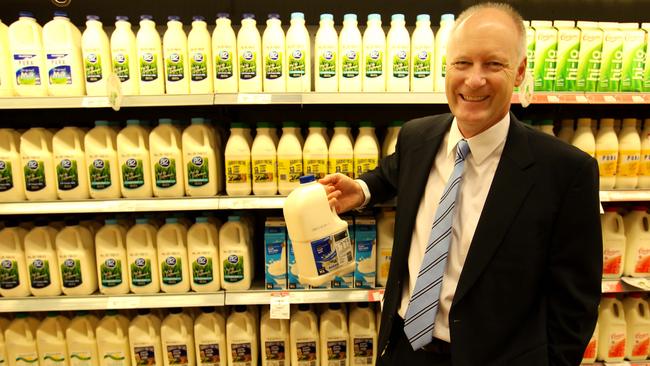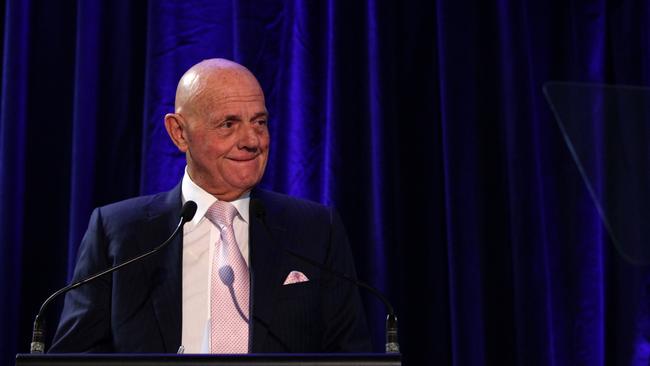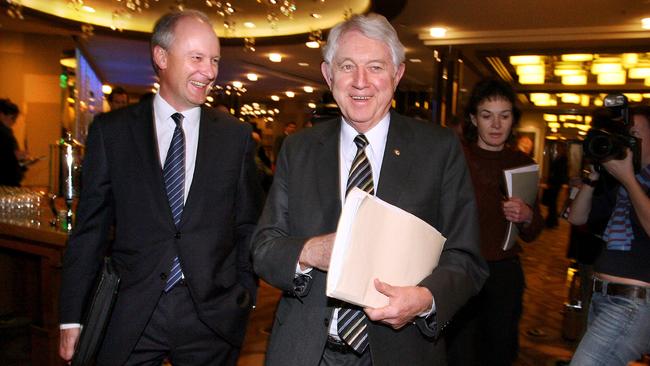Coles sale the latest chapter in a long-running supermarket saga
It was April 2, 2007 when Richard Goyder’s Wesfarmers signed a deal to buy a 5.9 per cent stake in Coles.

It was April 2, 2007 when Richard Goyder’s Wesfarmers signed a deal with a small but aggressive private investment firm to buy a 5.9 per cent stake in Coles. It was a deal that would electrify the stockmarket — as much for the blood feuds it ended as the stupendous dollars involved.
This was the first in a chain of deals that would open the door to Coles, and for Goyder, a cool-headed executive, Coles was the deal of his life. On the other side of the deal was the seller of the 5.9 per cent of Coles — Solomon Lew’s Premier Investments. For Lew, who had pursued Coles with a determination that went beyond passion, it was the end of an era.
With Premier’s stake in hand, Wesfarmers, the Perth-based conglomerate and owner of Bunnings, together with a consortium of banks and private equity firms, swarmed into the market, snapping up Coles shares until they had 13 per cent. By the time Goyder visited Coles’ chairman Rick Allert the next day, the battle was over.
Wesfarmers had agreed to pay Lew’s Premier $16.47 a share for the cornerstone stake that laid the groundwork for the Wesfarmers raid on Coles to follow. Rick Allert and Lew had crossed swords for years, with Allert fending off Lew’s furious attacks on Coles’ performance. The two would exchange insult for insult even after the bodies in this long-running war of attrition were buried.

Wesfarmers pouncing on Coles was a deal that followed 18 months of sabre-rattling, backroom intrigue, and moves by some of the biggest global players in the world — much of this guided and provoked by Lew — to unravel the Coles board and dislodge management.
Coles was the company that had started life in 1920s Melbourne as GJ Coles — with the proud boast “nothing over 2/6”. By the mid-1980s it had merged with another Melbourne grande dame to become Coles Myer.
By 2006, in a reverse-dance, the Myer department stores were sold off to private equity. Coles had had as its chairman over the years such corporate tough guys as Lew, Nobby Clark, Stan Wallis and finally Rick Allert.
Through all of the years since Lew had been replaced as chair in 1995 — after controversy over the ‘‘Yannon’’ share transactions in the company — he had fought back. He was forced off the board finally in 2002 after a string of power plays, with the help of Allert and then CEO John Fletcher. The two became the focus of Lew’s running battles over management competence, much of this an easy target as the company introduced and then withdrew or revised strategy after strategy. By 2005, many observers, deal-hungry bankers, and certainly Lew himself regarded Coles as a mess. In late 2005, Lew resolved to take action, to bring things to a head. He got in touch with a man he had known for years — someone with an appetite for a company in trouble. George Roberts was a founder of the giant takeover firm Kohlberg Kravis Roberts, and Coles was trailing blood in the water.
With the Coles share price around $11, Lew recommended that KKR take a close look; by April 2006 Roberts was in Australia meeting with Lew’s team. Coles, with its raft of companies — Target, Officeworks and Kmart — was a big chunk of business and it seemed to be ripe for a raider.
On July 31, 2006, Fletcher released a five-year strategy. There would be (a disastrous) rebranding of the Bi-Lo stores to the Coles brand, there would be a $300 million writedown for ‘‘strategic initiatives’’ and a ‘‘pause’’ in profit growth for 2007. Century Plaza, Lew’s private company, sent off a barrage of criticism. Analysts were almost as abusive. The share price crashed 7 per cent to $10.56. It was a shocking outcome following a CEO’s new strategy, a strategy that had been promised for the best part of a year.
Two weeks later, on August 17, 2006, KKR unleashed its claws — with a consortium that included the Carlyle Group, CVC Asia-Pacific, TPG, and the Blackstone Group — and a bid of $14.50, valuing Coles at $17.3 billion. Three weeks later the Coles board rejected the offer. A fortnight later, Coles issued a big new forecast of 35 per cent growth for the next year. It just raised more questions.

KKR was back within weeks offering $15.25. It was rejected a day later. Coles settled in to fight, with a share price boosted 30 per cent by the attentions of KKR and its fellow sharks.
If the Coles board thought they had fended off Solomon Lew with new suitors, they would be proved sorely wrong. Lew, after all, would be part of the show from the first act to the last.
On February 23, 2007, the Coles board gave up. Suddenly, Coles was for sale. The company revealed that a promised $1 billion profit target could not be met. The new five-year strategy soon seemed in trouble too. But the board would never acknowledge failings. Allert would say later the time was right to sell; that Fletcher’s turnaround strategy had borne fruit.
The global raiders had gone quiet — although KKR would return for a third bite at Coles before retreating dramatically after a period in the data room.
But a newly awakened suitor in Perth now turned its full focus on Coles. Less than a month after the Coles board signalled the end was near, a top banker acting for Wesfarmers phoned Lew’s Century Plaza. Would Solly sell? After all the years of drama and blood, would Lew contemplate a deal?
It would be a deal that would have to go to Premier Investments as owner of the shares. But it would be Lew’s deal in truth. Lew’s private vehicle Century Plaza owned 52.4 per cent of Premier and Premier was the largest single shareholder in Coles with its 5.9 per cent, or 69.5 million shares.
In the end, Lew was willing. It would be a deal with Wesfarmers that gave Lew upside on the upside. If things fell apart later, it would not affect Premier. Everything was stitched tightly together as befit the wily Lew and his board of take-no-prisoner directors.
It was reported by the Australian Financial Review at the time that Premier board member Gary Weiss turned afterwards to his fellow board member Ron Brierley, saying: “It ends, Ron, not with a bang, but a whimper.”
With the Premier stake in hand, Wesfarmers had won. It might look like a basket case then, but the years would prove the deal had decent legs. Valuing Coles at $20.8 billion, Richard Goyder had done more than buy the company. He had brought to a close a story that had seemed at times more Shakespeare than Deal-book. But it was finally the end of the affair.

To join the conversation, please log in. Don't have an account? Register
Join the conversation, you are commenting as Logout